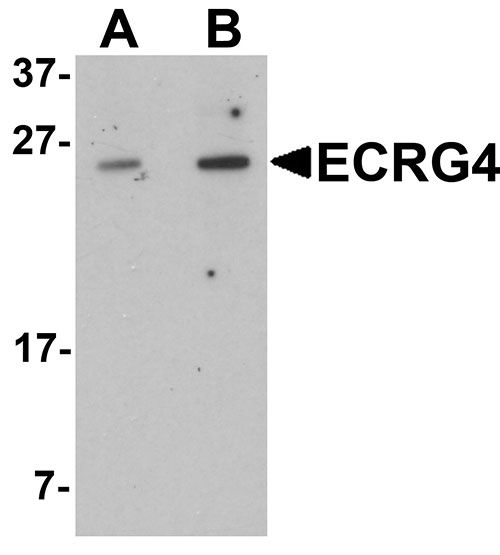ECRG4 Antibody
- SPECIFICATION
- CITATIONS
- PROTOCOLS
- BACKGROUND

Application
| WB, ICC, E |
|---|---|
| Primary Accession | Q9H1Z8 |
| Other Accession | Q9H1Z8, 84417 |
| Reactivity | Human, Mouse, Rat |
| Host | Rabbit |
| Clonality | Polyclonal |
| Isotype | IgG |
| Calculated MW | 17183 Da |
| Application Notes | ECRG4 antibody can be used for detection of ECRG4 by Western blot at 1 - 2 μg/mL. Antibody can also be used for immunocytochemistry starting at 5 μg/mL. |
| Gene ID | 84417 |
|---|---|
| Target/Specificity | ECRG4 antibody was raised against a 20 amino acid synthetic peptide near the carboxy terminus of human ECRG4. The immunogen is located within the last 50 amino acids of ECRG4. |
| Reconstitution & Storage | ECRG4 antibody can be stored at 4℃ for three months and -20℃, stable for up to one year. As with all antibodies care should be taken to avoid repeated freeze thaw cycles. Antibodies should not be exposed to prolonged high temperatures. |
| Precautions | ECRG4 Antibody is for research use only and not for use in diagnostic or therapeutic procedures. |
| Name | ECRG4 (HGNC:24642) |
|---|---|
| Synonyms | C2orf40 |
| Function | Probable hormone that may attenuate cell proliferation and induce senescence of oligodendrocyte and neural precursor cells in the central nervous system (By similarity). ECRG4-induced senescence is characterized by G1 arrest, RB1 dephosphorylation and accelerated CCND1 and CCND3 proteasomal degradation (By similarity). |
| Cellular Location | Secreted. Cytoplasm. Apical cell membrane |
| Tissue Location | Expressed in the brain, with expression in the epithelial cell layer of the choroid plexus (at protein level) |

Thousands of laboratories across the world have published research that depended on the performance of antibodies from Abcepta to advance their research. Check out links to articles that cite our products in major peer-reviewed journals, organized by research category.
info@abcepta.com, and receive a free "I Love Antibodies" mug.
Provided below are standard protocols that you may find useful for product applications.
Background
ECRG4 Antibody: The esophageal cancer-related gene 4 (ECRG4), also known as Augurin, was identified through differential display screening between esophageal cancer and normal tissue. Hypermethylation of CpG sites in the ECRG4 promoter correlate with ECRG4 downregulation in numerous esophageal squamous cell carcinoma tissues.. In transfected cells, overexpression of ECRG4 induced G1 arrest, dephosphorylation of Rb and decreased expression of cyclins D1 and D3. Increased expression of ECRG4 in aged mouse brain is observed compared with young mouse brain. The increased ECRG4 level was accompanied by elevated senescence-associated acidic beta-galactosidase activity, suggesting that ECRG4 is involved in cellular differentiation and senescence.
References
Su T, Liu H, and Lu S. Cloning and identification of cDNA fragments related to human esophageal cancer. Zhonghua Zhong Liu Za Zhi 1998; 20:254-7.
Yue CM, Deng DJ, Bi MX, et al. Expression of ECRG4, a novel esophageal cancer-related gene, downregulated by CpG island hypermethylation in human esophageal squamous cell carcinoma. World J. Gastroenterol. 2003; 9:1174-8.
Kujuro Y, Suzuki N, and Kondo T. Esophageal cancer-related gene 4 is a secreted inducer of cell senescence expressed by aged CNS precursor cells. Proc. Natl. Acad. Sci. USA 2010; 107:8259-64.
If you have used an Abcepta product and would like to share how it has performed, please click on the "Submit Review" button and provide the requested information. Our staff will examine and post your review and contact you if needed.
If you have any additional inquiries please email technical services at tech@abcepta.com.













 Foundational characteristics of cancer include proliferation, angiogenesis, migration, evasion of apoptosis, and cellular immortality. Find key markers for these cellular processes and antibodies to detect them.
Foundational characteristics of cancer include proliferation, angiogenesis, migration, evasion of apoptosis, and cellular immortality. Find key markers for these cellular processes and antibodies to detect them. The SUMOplot™ Analysis Program predicts and scores sumoylation sites in your protein. SUMOylation is a post-translational modification involved in various cellular processes, such as nuclear-cytosolic transport, transcriptional regulation, apoptosis, protein stability, response to stress, and progression through the cell cycle.
The SUMOplot™ Analysis Program predicts and scores sumoylation sites in your protein. SUMOylation is a post-translational modification involved in various cellular processes, such as nuclear-cytosolic transport, transcriptional regulation, apoptosis, protein stability, response to stress, and progression through the cell cycle. The Autophagy Receptor Motif Plotter predicts and scores autophagy receptor binding sites in your protein. Identifying proteins connected to this pathway is critical to understanding the role of autophagy in physiological as well as pathological processes such as development, differentiation, neurodegenerative diseases, stress, infection, and cancer.
The Autophagy Receptor Motif Plotter predicts and scores autophagy receptor binding sites in your protein. Identifying proteins connected to this pathway is critical to understanding the role of autophagy in physiological as well as pathological processes such as development, differentiation, neurodegenerative diseases, stress, infection, and cancer.



